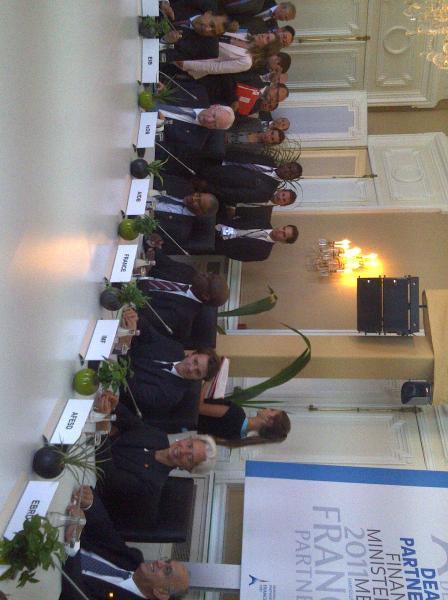
At the meeting of the Deauville Partnership Finance Ministers held in Marseille on 10 September 2011 under the auspices of the G-8, the European Investment Bank (EIB) confirmed its commitment to increasing its financing operations in Tunisia, Egypt, Morocco and Jordan in support of the transition to democracy in the Mediterranean. The four countries in question will receive US$ 7.5bn from the EIB by the end of 2013.
Addressing the Ministers, EIB President Philippe Maystadt stated that “the Deauville Partnership, which was launched by the G-8 Summit on 26-27 May of this year, has already enabled the resources deployed by the international financial institutions to promote democracy in the Mediterranean to be significantly increased. I am delighted that this partnership is being extended to Jordan and Morocco, and to the Arab regional financial institutions, with the support of the Gulf countries and Turkey. I am personally committed to ensuring that the EIB further steps up its activities within this wider framework, both in terms of financial volumes and by developing joint operations with our financial partners working in the region”.
“The Bank loans will support the priorities set out by the transition countries in their democratic development plans presented to the Ministers; the pace at which the loans are provided will depend on the progress made with the democratic process in the partner countries”, President Maystadt added. “The amount corresponds to a doubling of the level of our lending in the countries in question, compared with the already exceptional volume of €2.6bn deployed by the Bank in 2010 in response to the economic crisis. The finance we will be providing will go to projects that will rapidly create employment, involving SMEs, microfinance and infrastructure (e.g. public transport, opening up underdeveloped regions, social housing, urban development, energy and the environment). Egypt is expected to be the first beneficiary (US$ 3bn), followed by Morocco, Tunisia and Jordan”, the President concluded.
In order to strengthen their respective contributions, the nine financial institutions involved in the Deauville Partnership have established a platform to coordinate activities that will report annually to the Deauville Partnership Ministers on progress that has been made and the joint operations. “This is a major step forward as a result of the Deauville process”, pointed out Philippe de Fontaine Vive, EIB Vice-President in charge of FEMIP. “The group of five international financial institutions[1] is currently coordinating its activities with the regional Arab institutions (Islamic Development Bank, Arab Fund for Economic and Social Development, OPEC Fund, Arab Monetary Fund), which bring to the partnership their economic analyses and financial instruments”.
The EIB will also develop joint operations with its counterparts. Thus, the EIB and the EBRD are going to extend their existing cooperation agreements in order to accelerate the EBRD’s first operations in the Mediterranean. The EIB and its partners in the “InfraMed” investment fund (for financing infrastructure) are planning to extend this facility to other financial institutions. Also the World Bank and the EIB, co-founders of the Marseille Center for Mediterranean Integration (CMI[2]), will be launching, alongside six of the region’s governments, a new action strategy by the end of the year.
Since the European Union has initiated the decision-making process to include Libya as one of the beneficiaries of its Neighbourhood Policy, the EIB stands ready to provide its support to the transitional authorities, with a view to contributing to the effort to rebuild the country.
Notes to the editor:
EIB: the leading financial investor in the Mediterranean
The European Investment Bank is the European Union’s financial institution and the leading financial investor in the Mediterranean via FEMIP, which was established in October 2002. FEMIP provides practical support for economic and social development in the Mediterranean with the aim of improving living conditions in the partner countries. At end-2010, this commitment represented a total investment of more than EUR 12 billion. In 2010, FEMIP had already increased its business volume by 60% – to EUR 2.6 billion – thereby consolidating its position as the leading development investor in the Mediterranean (see: www.eib.org/femip).
[2] See www.cmimarseille.org

Photographer: EIB ©EIB
Download original